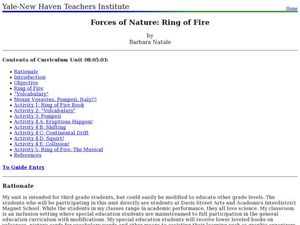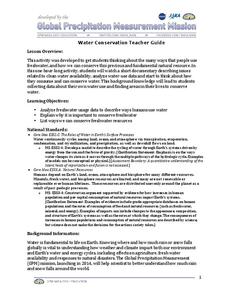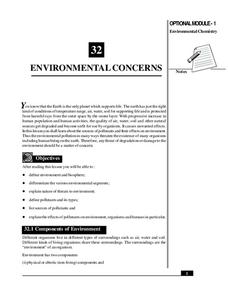Teach Engineering
Design Inspired by Nature
Let nature guide your engineering designs. By taking apart a flower, pupils learn about reverse engineering. They use the results to brainstorm designs for new products or ideas. This is the seventh installment of a nine-part Life...
Nevada Outdoor School
Let It Snow! Let It Melt!
Winter weather offers a great opportunity to teach young scientists about the states of matter. This activity-based lesson includes a range of learning experiences, from experimenting with the rate at which ice melts...
Towson University
Mystery Tubes
How do scientists know they're right? Truth be told, they don't always know. Explore the scientific process using mystery tubes in an insightful activity. Young scientists discover how to approach and solve problems in science, how ideas...
Curated OER
Forces of Nature: Ring of Fire
Third graders will research the Ring of Fire and be able to share their findings with their partner. They will also demonstrate volcanic eruptions using a baking soda and vinegar volcano model. Then they will discover how continental...
Institute of Electrical and Electronics Engineers
Biomimicry in Engineering
Take a look with your class at how nature supplies inspiration to engineers. In cooperative groups, youngsters research biomimicry and then develop a system that would help support people living on the moon. Each team also considers...
May Media Group
Treatment Plants
Young scientists explore nature's water treatment plants in this simple science demonstration. By placing a stalk of celery in a cup of water mixed with food coloring, children are able to observe how plants absorb nutrients and...
SF Environment
Sort and Color!
Sorting is a very important skill that can be used in math and even science. Learners get familiar with some environmentally friendly vocabulary terms as they practice separating objects that can be recycled from those that can't. They...
Curated OER
Water Conservation
Open learners' eyes to the challenge of finding safe drinking water – something we often take for granted in our country. The PowerPoint presentation includes images, graphs, diagrams, and even a video to stimulate discussion on how we...
It's About Time
Succession in Communities
What occurs following a natural disaster? High schoolers research this question and others as they investigate natural succession after a disaster. First, as they differentiate between primary and secondary succession, they explain...
Polar Trec
Talk Story: A Native Way of Knowing
The steps of the scientific method examine a problem, make a prediction, and attempt to solve the problem—similar to the path most stories take. In the activity, individuals see how stories can explain natural events similar to the way...
Curated OER
Applied Science - Science and Math Lab
Learners investigate topology. In this Applied Science lesson students explore higher, more abstract mathematics using tangles. Learners make topologically related shapes.
Science Matters
Ring of Fire
Over a period of 35 years, earthquakes and volcanoes combined only accounted for 1.5 percent of the deaths from natural disasters in the United States. The 15th lesson in a 20-part series connects the locations of earthquakes and...
Cornell Lab of Ornithology
Investigating Evidence
Explore the scientific process through nature. Scholars become scientists as they develop a question, design an experiment, collect data, and analyze their results. A two-week lesson guides your classes through the process and provides...
Earth Day Network
Conserving Water Through Art!
Having fresh, clean drinking water is a privilege many people take for granted. Help raise awareness about the scarcity of water and the importance of conservation by discussing different ways water is used in everyday life. Brainstorm...
National Institute of Open Schooling
Environmental Concerns
Every year, more than 14 billion pounds of garbage is dumped into the oceans of the world, most of which is plastic and toxic to ocean life. Lesson 32 in the series of 36 focuses on environmental concerns, specifically pollution. Under...
It's About Time
Polymers
All plastics contain polymers, but not all polymers are plastic. Young chemists make their own polymer and compare the properties to those of other states of matter. After a reading passage, pupils answer analysis questions about natural...
Serendip
Changing Biological Communities – Disturbance and Succession
After cutting down a forest to make a farm, how long would it take the environment to turn an abandoned farm back into a forest? Scholars study this exact scenario while they interpret many charts and graphs of the changing ecosystems as...
It's About Time
What Drives the Plates?
It's getting hot in here! Lead your emerging geoscientists on a thrilling journey as they calculate liquid densities to determine forces that stimulate thermal plates from within the earth's crust. They explore effects of temperature on...
Rainforest Alliance
Sounds of the Rainforest
Do you hear what I hear? Encourage scholars to use their listening skills and participate in a series of activities that demonstrate how the sense of hearing is crucial to the human and animal world. Activities guide learners...
Curated OER
Marine Energy
In small groups, energy engineers research and make a topographic map of a marine natural resource. They report to the rest of the class pros and cons of extracting their assigned resource. The two activities may take up to four class...
Curated OER
US Energy Geography
The maps display the statistics for energy consumption and power production, state by state. They are tremendous visual aids for your natural resources unit. Consider having your class compare energy consumption versus production, or...
Curated OER
Land Plan Challenge
Links to two different versions of this mapping activity are available. In "The Small Version," youngsters design a town, keeping the water supply in mind. In "The Large Version," they also design a town, but they consider services and...
Curated OER
Coal Derivatives by Destructive Distillation
Chemists use the destructive distillation technique to produce three derivatives from a sample of bituminous coal. You will find background information, a materials list, procedures, and sample follow-up questions that you can use in...
Texas State Energy Conservation Office
Creating an Advertisement
Advertising for the purpose of influencing public policy regarding the use of alternative fuels is the focus of an innovative and engaging lesson. Learners are split up into six team in order to create an advertising campaign that...
Other popular searches
- Nature of Science
- History and Nature of Science
- The Nature of Science
- Nature of Science Biology
- Nature of Science Inquiry
- Nature of Science Physics
- History Nature of Science
- Genetics Nature of Science
- Teaching Nature of Science
- Nature Science
- Nature of Science Weather
- Genetic Nature of Science

























